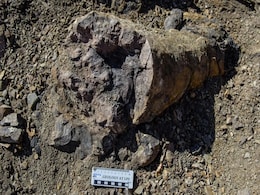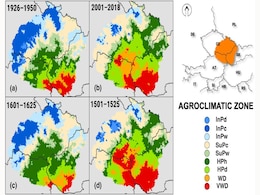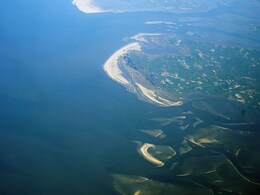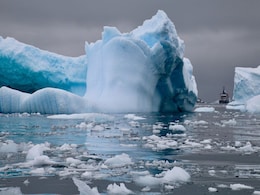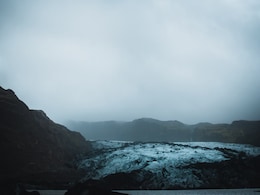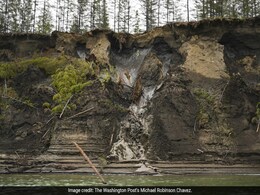Regional Climate Shifts
- All
- News
-

Fossil Evidence Shows Plants Survived the End-Permian Mass Extinction in China
- Tuesday March 18, 2025
- Written by Gadgets 360 Staff
Fossils discovered in China indicate that the End-Permian mass extinction, which wiped out 80% of life on Earth, may not have been as devastating for plants as previously thought. Researchers found evidence of gymnosperm forests and ferns in rock layers from this period, suggesting that some ecosystems remained intact. This discovery challenges ass...
-
 www.gadgets360.com
www.gadgets360.com
-

Solar System’s Journey Through Orion Complex May Have Altered Earth’s Climate
- Monday March 3, 2025
- Written by Gadgets 360 Staff
Scientists have studied the solar system’s passage through the Orion complex, a dense region in space, around 14 million years ago. According to researchers, this movement may have compressed the heliosphere and increased interstellar dust reaching Earth. This dust could have influenced the planet’s climate and left traces in geological records...
-
 www.gadgets360.com
www.gadgets360.com
-

Climate-Driven Changes Reduce Agricultural Productivity in Central Europe, Claims New Study
- Monday January 27, 2025
- Written by Gadgets 360 Staff
Climate change has significantly impacted Central Europe's farmland, with over 50 percent of highly productive agricultural land already affected. A study combining historical data and climate projections highlights that rising temperatures and dry conditions have shifted fertile zones northward and westward. Regions like Slovakia, Austria and the ...
-
 www.gadgets360.com
www.gadgets360.com
-

Massive Ice Age Landforms Found Under North Sea Provide Key Insights into Ancient Glaciers
- Wednesday January 22, 2025
- Written by Gadgets 360 Staff
Scientists have uncovered massive ice age landforms buried deep beneath the North Sea, revealing patterns of a colossal ice sheet that existed 1 million years ago. Using high-resolution sound wave imaging, researchers discovered features indicating a single, large ice sheet that shaped the region’s landscape. These findings provide new perspectiv...
-
 www.gadgets360.com
www.gadgets360.com
-

Rising Droughts Threaten Agriculture, Energy, and Ecosystems Worldwide
- Monday January 20, 2025
- Written by Gadgets 360 Staff
Extreme droughts have become more frequent and severe in recent decades, severely impacting agriculture, energy production, and ecosystems worldwide. Prolonged dry spells have expanded by 50,000 square kilometres each year since 1979, as temperatures rise and precipitation patterns shift. This has led to significant economic losses, particularly in...
-
 www.gadgets360.com
www.gadgets360.com
-

Tracing the Origins of Oaks: How Climate and Tectonic Changes Shaped Modern Trees
- Monday December 23, 2024
- Written by Gadgets 360 Staff
Oaks, iconic trees in today’s forests, evolved over millions of years, influenced by significant climatic events like the Paleocene-Eocene Thermal Maximum. Fossils found in Austria reveal the earliest oak evidence, while tectonic movements led to the diversification of oak species across continents. Oaks adapted to changing climates, making their...
-
 www.gadgets360.com
www.gadgets360.com
-

Study Warns Saltwater Intrusion Threatens Global Coastal Groundwater by 2100
- Monday December 16, 2024
- Reported by Gadgets 360 Staff, Written by Gadgets 360 Staff
A NASA-DOD study indicates that by 2100, 77% of global coastal aquifers will face saltwater intrusion due to rising sea levels and reduced groundwater recharge. This phenomenon, caused by shifting fresh and saltwater dynamics, threatens water quality, agriculture, and infrastructure. Low-lying regions, including Southeast Asia, the U.S. Eastern Sea...
-
 www.gadgets360.com
www.gadgets360.com
-

Arctic Ocean Likely to Experience Ice-Free Day by 2027, Study Warns
- Thursday December 5, 2024
- Written by Gadgets 360 Staff
A study published in Nature Communications predicts the Arctic Ocean could face its first ice-free day as early as 2027, marking a critical environmental milestone. Conducted using 11 climate models and 366 simulations, the research highlights the urgent need for emission reductions. The loss of sea ice in the Arctic exacerbates global warming thro...
-
 www.gadgets360.com
www.gadgets360.com
-

Thawing Permafrost Releases Greenhouse Gases, Contributing to Global Warming
- Friday November 1, 2024
- Written by Gadgets 360 Staff
Recent studies reveal alarming changes in the Arctic's permafrost, which has been a significant carbon reservoir for millennia. As temperatures rise, thawing permafrost is releasing greenhouse gases, particularly methane. This shift is changing the region from a carbon sink to a net contributor to global warming. Research indicates that emissions f...
-
 www.gadgets360.com
www.gadgets360.com
-

Arctic May Have Crossed Key Threshold, Emitting Several Tons Of Carbon
- Wednesday December 11, 2019
- World News | Andrew Freedman, The Washington Post
The Arctic is undergoing a profound, rapid and unmitigated shift into a new climate state, one that is greener, features far less ice, and is a net source of greenhouse gas emissions from melting permafrost, according to a major new federal assessment of the region released Tuesday.
-
 www.ndtv.com
www.ndtv.com
-

Climate Change is Shifting Areas of Skin Disease Concern
- Monday October 24, 2016
- Thomson Reuters
Climate change is bringing certain skin diseases and other illnesses to regions where they were rarely seen before, according to a recent research review.
-
 food.ndtv.com
food.ndtv.com
-

Global Warming 'Tipping Points' Identified
- Friday October 16, 2015
- World News | Indo-Asian News Service
An international team of scientists has identified potential 'tipping points' where abrupt regional climate shifts due to global warming could result in natural disasters.
-
 www.ndtv.com
www.ndtv.com
-
Shift to a new climate likely by mid-century: study
- Thursday October 10, 2013
- World News | Reuters
Billions of people could be living in regions where temperatures are hotter than their historical ranges by mid-century, creating a "new normal" that could force profound changes on nature and society, scientists said on Wednesday.
-
 www.ndtv.com
www.ndtv.com
-

Fossil Evidence Shows Plants Survived the End-Permian Mass Extinction in China
- Tuesday March 18, 2025
- Written by Gadgets 360 Staff
Fossils discovered in China indicate that the End-Permian mass extinction, which wiped out 80% of life on Earth, may not have been as devastating for plants as previously thought. Researchers found evidence of gymnosperm forests and ferns in rock layers from this period, suggesting that some ecosystems remained intact. This discovery challenges ass...
-
 www.gadgets360.com
www.gadgets360.com
-

Solar System’s Journey Through Orion Complex May Have Altered Earth’s Climate
- Monday March 3, 2025
- Written by Gadgets 360 Staff
Scientists have studied the solar system’s passage through the Orion complex, a dense region in space, around 14 million years ago. According to researchers, this movement may have compressed the heliosphere and increased interstellar dust reaching Earth. This dust could have influenced the planet’s climate and left traces in geological records...
-
 www.gadgets360.com
www.gadgets360.com
-

Climate-Driven Changes Reduce Agricultural Productivity in Central Europe, Claims New Study
- Monday January 27, 2025
- Written by Gadgets 360 Staff
Climate change has significantly impacted Central Europe's farmland, with over 50 percent of highly productive agricultural land already affected. A study combining historical data and climate projections highlights that rising temperatures and dry conditions have shifted fertile zones northward and westward. Regions like Slovakia, Austria and the ...
-
 www.gadgets360.com
www.gadgets360.com
-

Massive Ice Age Landforms Found Under North Sea Provide Key Insights into Ancient Glaciers
- Wednesday January 22, 2025
- Written by Gadgets 360 Staff
Scientists have uncovered massive ice age landforms buried deep beneath the North Sea, revealing patterns of a colossal ice sheet that existed 1 million years ago. Using high-resolution sound wave imaging, researchers discovered features indicating a single, large ice sheet that shaped the region’s landscape. These findings provide new perspectiv...
-
 www.gadgets360.com
www.gadgets360.com
-

Rising Droughts Threaten Agriculture, Energy, and Ecosystems Worldwide
- Monday January 20, 2025
- Written by Gadgets 360 Staff
Extreme droughts have become more frequent and severe in recent decades, severely impacting agriculture, energy production, and ecosystems worldwide. Prolonged dry spells have expanded by 50,000 square kilometres each year since 1979, as temperatures rise and precipitation patterns shift. This has led to significant economic losses, particularly in...
-
 www.gadgets360.com
www.gadgets360.com
-

Tracing the Origins of Oaks: How Climate and Tectonic Changes Shaped Modern Trees
- Monday December 23, 2024
- Written by Gadgets 360 Staff
Oaks, iconic trees in today’s forests, evolved over millions of years, influenced by significant climatic events like the Paleocene-Eocene Thermal Maximum. Fossils found in Austria reveal the earliest oak evidence, while tectonic movements led to the diversification of oak species across continents. Oaks adapted to changing climates, making their...
-
 www.gadgets360.com
www.gadgets360.com
-

Study Warns Saltwater Intrusion Threatens Global Coastal Groundwater by 2100
- Monday December 16, 2024
- Reported by Gadgets 360 Staff, Written by Gadgets 360 Staff
A NASA-DOD study indicates that by 2100, 77% of global coastal aquifers will face saltwater intrusion due to rising sea levels and reduced groundwater recharge. This phenomenon, caused by shifting fresh and saltwater dynamics, threatens water quality, agriculture, and infrastructure. Low-lying regions, including Southeast Asia, the U.S. Eastern Sea...
-
 www.gadgets360.com
www.gadgets360.com
-

Arctic Ocean Likely to Experience Ice-Free Day by 2027, Study Warns
- Thursday December 5, 2024
- Written by Gadgets 360 Staff
A study published in Nature Communications predicts the Arctic Ocean could face its first ice-free day as early as 2027, marking a critical environmental milestone. Conducted using 11 climate models and 366 simulations, the research highlights the urgent need for emission reductions. The loss of sea ice in the Arctic exacerbates global warming thro...
-
 www.gadgets360.com
www.gadgets360.com
-

Thawing Permafrost Releases Greenhouse Gases, Contributing to Global Warming
- Friday November 1, 2024
- Written by Gadgets 360 Staff
Recent studies reveal alarming changes in the Arctic's permafrost, which has been a significant carbon reservoir for millennia. As temperatures rise, thawing permafrost is releasing greenhouse gases, particularly methane. This shift is changing the region from a carbon sink to a net contributor to global warming. Research indicates that emissions f...
-
 www.gadgets360.com
www.gadgets360.com
-

Arctic May Have Crossed Key Threshold, Emitting Several Tons Of Carbon
- Wednesday December 11, 2019
- World News | Andrew Freedman, The Washington Post
The Arctic is undergoing a profound, rapid and unmitigated shift into a new climate state, one that is greener, features far less ice, and is a net source of greenhouse gas emissions from melting permafrost, according to a major new federal assessment of the region released Tuesday.
-
 www.ndtv.com
www.ndtv.com
-

Climate Change is Shifting Areas of Skin Disease Concern
- Monday October 24, 2016
- Thomson Reuters
Climate change is bringing certain skin diseases and other illnesses to regions where they were rarely seen before, according to a recent research review.
-
 food.ndtv.com
food.ndtv.com
-

Global Warming 'Tipping Points' Identified
- Friday October 16, 2015
- World News | Indo-Asian News Service
An international team of scientists has identified potential 'tipping points' where abrupt regional climate shifts due to global warming could result in natural disasters.
-
 www.ndtv.com
www.ndtv.com
-
Shift to a new climate likely by mid-century: study
- Thursday October 10, 2013
- World News | Reuters
Billions of people could be living in regions where temperatures are hotter than their historical ranges by mid-century, creating a "new normal" that could force profound changes on nature and society, scientists said on Wednesday.
-
 www.ndtv.com
www.ndtv.com

